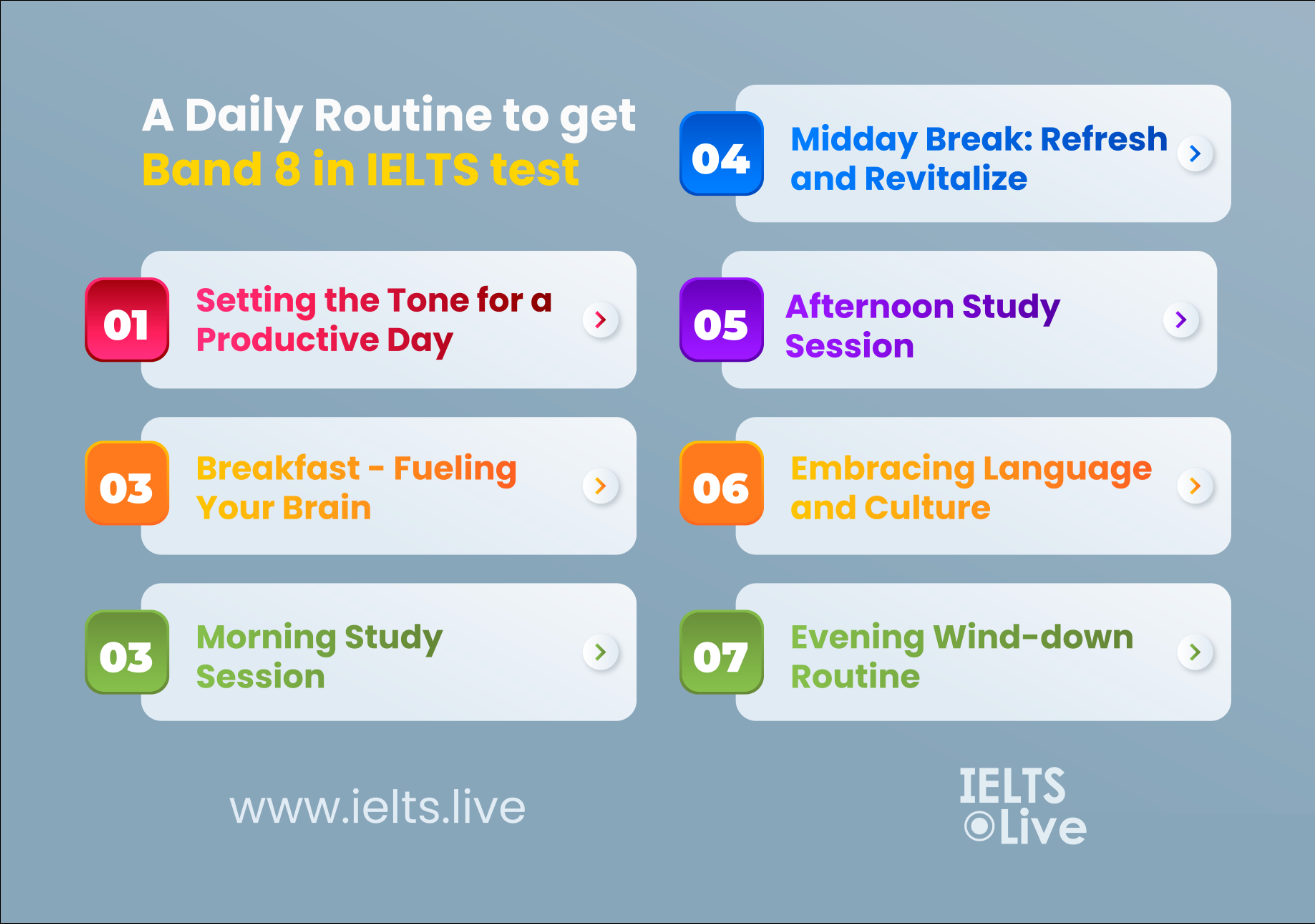
Did you know that having a well-structured daily routine significantly increases your chances of success in any venture? And that includes the IELTS exam prep too!
But we often fail to stick to our daily routines, right?
So today I'll help you design a routine to which you will actually stick to. So, without further ado, let’s get into it.
You may also like: The secret to acing the IELTS test format - Revealed!
1. Setting the Tone for a Productive Day:
- A successful day can be set in motion by positive affirmations at the start of the day. Remind yourself of your strengths so that you can overcome the IELTS challenge. Tell yourself things like, "I am a confident communicator," or "I am capable of getting the grade I want." You can build a resilient mindset and increase your self-confidence by repeatedly reinforcing these beliefs. This will make it simpler for you to overcome any challenges that come your way.
- Practise being mindful and grateful. Accept mindfulness as a tool for focusing your thoughts and feelings. Spend a few minutes each morning thinking about the good things in your life and the IELTS preparation process. Be thankful for the progress you've already made or the assistance you've received from family and friends. You can foster motivation and a sense of contentment by practising gratitude, which will also help you prepare for the IELTS while feeling less stressed and anxious.
- Kickstart your day with some energising exercise, whether it's a brisk walk, a yoga session, or a quick workout. Physical activity not only boosts your energy levels but also enhances cognitive function and memory retention. Research has shown that engaging in exercise before studying can improve focus and information processing, helping you absorb and retain the study material more effectively. So, get your body moving and witness the positive impact it has on your IELTS performance.
2. Breakfast: Fueling Your Brain:
- For IELTS candidates, the popular saying that breakfast is the most important meal of the day couldn't be more accurate. To perform at its peak during study sessions and the test itself, your brain needs to receive the proper nutrition. Skipping breakfast can cause focus problems, energy slumps, and cognitive decline. So let's make breakfast a must-have component of your daily schedule.
- Choose a balanced breakfast that includes foods that are good for the brain, such as whole grains, fruits, nuts, and sources of protein. For instance, a bowl of muesli with fruit and nuts on top and a glass of milk or a plant-based substitute can give you long-lasting energy and maintain your mental clarity.
- I understand that time is precious during the morning rush, but that doesn't mean compromising on nutrition. Make quick and healthy breakfast options in advance, such as smoothie packs, toast with avocado or overnight oats. Having these meals prepared ensures that you never miss out on the benefits of breakfast for your brain.
3. Morning Study Session:
- Imagine a comfortable seating area with plush cushions, plenty of natural light, and your favourite inspirational sayings displayed on the walls. Create a fun and effective study environment. Distractions can be avoided with the help of a clutter-free area and a relaxing atmosphere.
- Set achievable study goals for each morning. Divide your subjects into bite-sized pieces, and acknowledge each accomplishment. It's like finding treasure along the way, bringing you nearer to the IELTS success treasure chest.
- Consider your study session as a grand feast of knowledge. Use a variety of study methods to activate your brain in different ways. Savour the flavours of learning, making sure the facts stick in your memory like Velcro, from reading and taking notes to participating in discussions and creating mind maps.

4. Midday Break: Refresh and Revitalise:
- Even the most sturdy ship needs to stop so it can dock and refuel. Understand the importance of taking lunch breaks. Moving away from your study desk gives your brain a chance to rest and refuel, making it more prepared to continue surfing the waves of knowledge.
- Try some relaxation techniques as you take a moment to yourself to calm the stress storm. Your anchor can be something as simple as deep breathing, a quick nature walks, or a brief period of meditation.
- During the midday break, keep your snacks fresh. Snack on brain-boosting foods like juicy fruits, hummus-topped crunchy vegetables, or a trail mix of nuts and dried fruit. For the remainder of the day, these treasures keep your energy levels high and your mind sharp.
5. Afternoon Study Session:
- It's time to review the material you covered in the morning as the day progresses. When you go over and practise the material, it becomes more ingrained in your memory and is therefore simpler for you to recall on the big exam day.
- Recognize your areas of weakness and face them head-on. Explore these difficulties in-depth, practise and practice and look for resources to help you turn them into strengths that will assist you in achieving your IELTS objectives.
- Mock exams can help you get ready for the real fight. These practice tests are similar to warm-up exercises that give you a taste of what's to come. Accept them as chances to improve your test-taking techniques, increase your self-assurance, and adjust your approach to the IELTS exam.
- As the afternoon session sets sail, reflect on the progress you've made so far. Your IELTS success is one step closer with every study session. You'll soon arrive at the shore of success if you remain committed and focused. Intrepid learner, move forward!
6. Embracing Language and Culture
- Take a deep breath and immerse yourself in the rich English language and culture. To increase your vocabulary and learn the nuances of the language, read books, articles, and the news in English. To enhance your listening abilities and become more accustomed to various accents and speaking styles, tune into English podcasts, and radio programmes, or watch English films. Just like a sponge soaks up water, absorb the richness of the language through varied sources.
- Language is a treasure meant to be shared! Talk to friends or language partners to practise your speech. Participate in wide-ranging conversations, voice your opinions, and actively listen. It's like going on a language adventure together, learning new words, and encouraging one another to do your best on the IELTS.
- Embark on a fun adventure with English-language films or television. It's not just for fun; it's also a great chance to pick up some new words. Study the gestures, intonations, and facial expressions used by native speakers. It's like exploring uncharted linguistic territory, and it gives your language abilities more depth and authenticity.
7. Evening Wind-down Routine:
- Think back on your day's activities as the sun starts to set. Celebrate your victories, such as learning new words, understanding difficult grammar rules, or improving your test scores. You experience a sense of accomplishment and are inspired for the days ahead when you reflect on your progress.
- Being grateful is like having a lantern that shines light on your path. Be grateful for the little victories you had that day. Perhaps a helpful study partner helped you out, or you finally understood a challenging linguistic concept. Embracing gratitude encourages a positive outlook, ensuring that you approach each new day with renewed vigour.
- Engage in soothing pursuits as the evening breeze caresses your mind. Invest some time in a fascinating book, a relaxing cup of tea, or a creative hobby. This downtime is a well-earned treasure trove that will recharge you for the adventures that lie ahead.
- Keep in mind that the evening wind-down routine is a calm harbour where you can recharge. If you accept this time with gratitude, you'll drift off to a peaceful sleep and wake up ready to tackle another day of IELTS preparations with full energy.
Finally, strike a balance between studying and taking good care of yourself. As important as studying is, self-care is just as important. Pay attention to your body's needs, feed it healthy foods, and take breaks to rest. Include hobbies and leisure pursuits in your daily schedule because they give you the wind to fill your sails and move forward.







0 COMMENTS